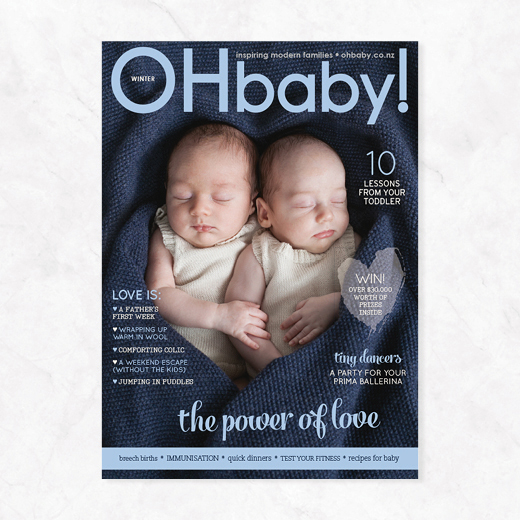How to get your pregnancy off to the best start

Support your body as it goes about the miraculous job of growing new life.
Why supplement
It’s hard work growing a baby. As OHbaby! naturopath Natasha Berman (qbaby.co.nz) points out, babies in utero are growing at a rapid rate of knots, yet nourished solely by what their mother eats and what already exists in her body. “It is therefore important that we see nutrients as building blocks for the growth and development of healthy babies and healthy adults”, says Natasha.
Eating well is foundational for a healthy pregnancy, but good nutrition is not always enough, hence the need to supplement even the best diet during pregnancy. While ‘eating for two’ holds little water these days, pregnant women should still be seeking double the nutrients. “While an adult may show no specific signs of any given nutrient deficiency, there can be many more detrimental consequences for a developing foetus”, says Natasha.
Food isn’t what it used to be. Natasha points out that modern farming practices have depleted the nutrient levels of our soils and, subsequently, fewer nutrients are transferred to our foods. Fertilisers used to boost production (increasing vegetable size and growth speed) compromise the nutritional value of crops. “Then the food is further assaulted with pesticides, herbicides and sprays, picked in an often unripe state, and transported many miles, further depleting vitamin stores”, says Natasha. Additionally, refining processes further strip nutrients from our food.

The essentials
New Zealand Ministry of Health recommendations state women planning a pregnancy, or women in the early stages of pregnancy, take folic acid and iodine.
Folic acid is a B vitamin proven to reduce the risk of neural tube defects (NTD), such as spina bifida and anencephaly. The suggested dose will either be a low dose of 800 mcg per day, or a high dose of 5 mg per day, depending on the perceived risk of having an NTD-affected pregnancy, for at least four weeks before conception and continuing for 12 weeks after conception.
150 mcg of iodine daily is recommended for healthy pregnant and breastfeeding women, from confirmation of pregnancy until the discontinuation of breastfeeding. This tablet should be taken in addition to eating well and choosing iodine-containing foods such as low-fat milk products, eggs, seafood, and commercially prepared bread (which is also fortified with folic acid).
Nutritional supplements are proven to support a developing baby with essential nutrients. Also, they can enhance both female and male fertility as they can improve the health and vitality of the adult taking them.
 |
Fabfol, RRP$27.95 from pharmacies. |
 |
Blackmores Conceive Well Gold, RRP$52.25 from pharmacies. |
 |
Menevit 90-pack, $98.99, 30-pack, $41.99 from pharmacies. |
 |
Elevit with Iodine 100-pack, $98.99, and 30-pack, $39.99 from pharmacies. |
The strength of iron
27mg per day is the recommended daily intake (RDI) of iron during pregnancy – about 9mg more per day than recommended for non-pregnant women. You may need to take an iron supplement if your iron stores are low.
 |
Spatone 100% Natural Liquid Iron Supplement, 28-day |
 |
Floradix, RRP$27.99 from supermarkets, pharmacies, and health stores. |

AS FEATURED IN ISSUE 30 OF OHbaby! MAGAZINE. CHECK OUT OTHER ARTICLES IN THIS ISSUE BELOW

















